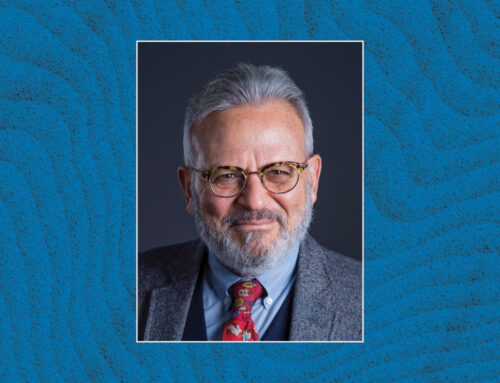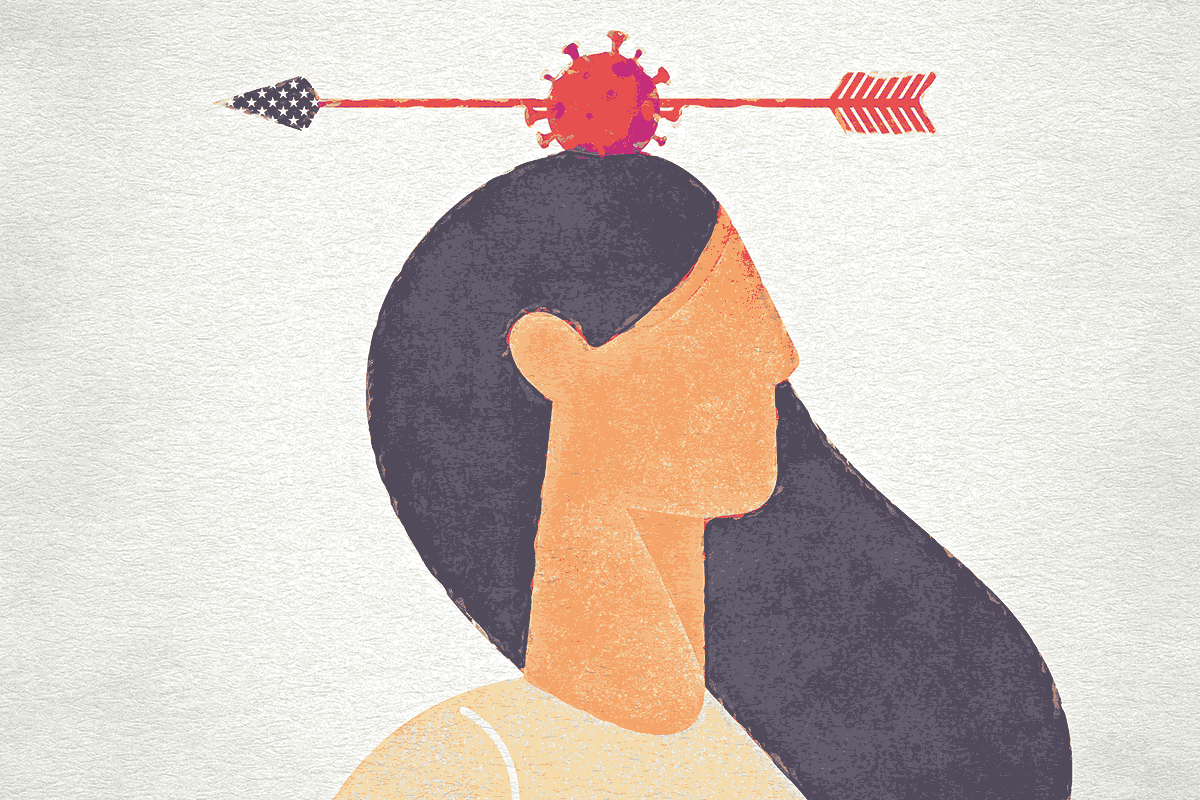
With a team of global experts, CUNY SPH undertakes ambitious surveys on perception of government response to Covid-19 and vaccine hesitancy worldwide.
by Elaine Meyer
Although the strong, sometimes violent, reactions against vaccination came as a surprise to many, a group of researchers at the CUNY Graduate School of Public Health and Health Policy (CUNY SPH) recognized early in the course of the pandemic that hesitancy could be a major obstacle in bringing Covid-19 under control. In 2020, a team comprising Dean Ayman El-Mohandes, Senior Scholar and Professor at the Barcelona Institute for Global Health (ISGlobal) at University of Barcelona Jeffrey Lazarus, together with Distinguished Lecturer Scott Ratzan, Senior Scholar Kenneth Rabin, and Associate Professor of Epidemiology and Biostatistics Katarzyna E. Wyka began a series of surveys comparing trust in government response to the pandemic in nations around the world, and soon after began to look at global hesitancy toward a potential Covid-19 vaccine.
The team conducted the surveys in 2020 and 2021, polling more than 36,000 people residing in 23 countries. The results raised critical awareness of vaccine hesitancy as an obstacle to achieving herd immunity globally, helped shape policy responses to the issue, and revealed that citizens in many nations did not trust their government’s pandemic response.
“Leading this series of global surveys was an opportunity to spotlight one of the most fundamental questions to a successful pandemic response, which is how well do citizens trust their government to protect them?” says Dean El-Mohandes. “A society can develop the most effective vaccines, but without the trust of the population, prevention and treatment efforts can run into real trouble, as we’ve seen. Collecting survey data helps us understand and respond to this issue on a global level.”
The Survey’s Global Influence
The vaccine attitudes survey, first conducted in June 2020, with a follow-up a year later, found wide variation, with as high as 97.6 percent of respondents in China and 90.2 percent in Brazil and as low as 57 percent in Nigeria and 51.6 percent in Russia saying they would get vaccinated.
The survey was the earliest comprehensive report of public attitudes toward Covid-19 vaccination and toward governments’ responses to the pandemic. The research team started with 19 countries and increased to 23 in 2021. The countries surveyed represent 60 percent of the global population.
“The results of the 2020 survey were shared in a very early article looking at Covid vaccine acceptance globally, and it was especially relevant since we intentionally targeted some of the hardest hit countries, where vaccine acceptance had both national and global implications,” said Dean El-Mohandes.
The landmark paper was published in October 2020 in Nature Medicine, and received widespread coverage around the globe, with over 2,500 media hits, according to Altmetric, a service that tracks scholarly publications. The authors continue to be sought out as experts as vaccination hesitancy becomes an urgent issue for the U.S. and European countries with enough supply but a sizable population reluctant to get a shot.
“What surprises me is the continued broad spectrum of acceptance rates in 2021,” says Dean El-Mohandes.
While overall acceptance of vaccines rose from 71.5 percent to 75.6 percent from 2020 to 2021, respondents in Nigeria, the U.S., and South Africa, saw a drop, by eight percent, nine percent, and 21 percent respectively over that period.
“If we are interested in creating global coverage, it’s worrisome that populous countries like Russia or Poland or Nigeria have acceptance rates of less than 60 percent,” says Dean El-Mohandes.
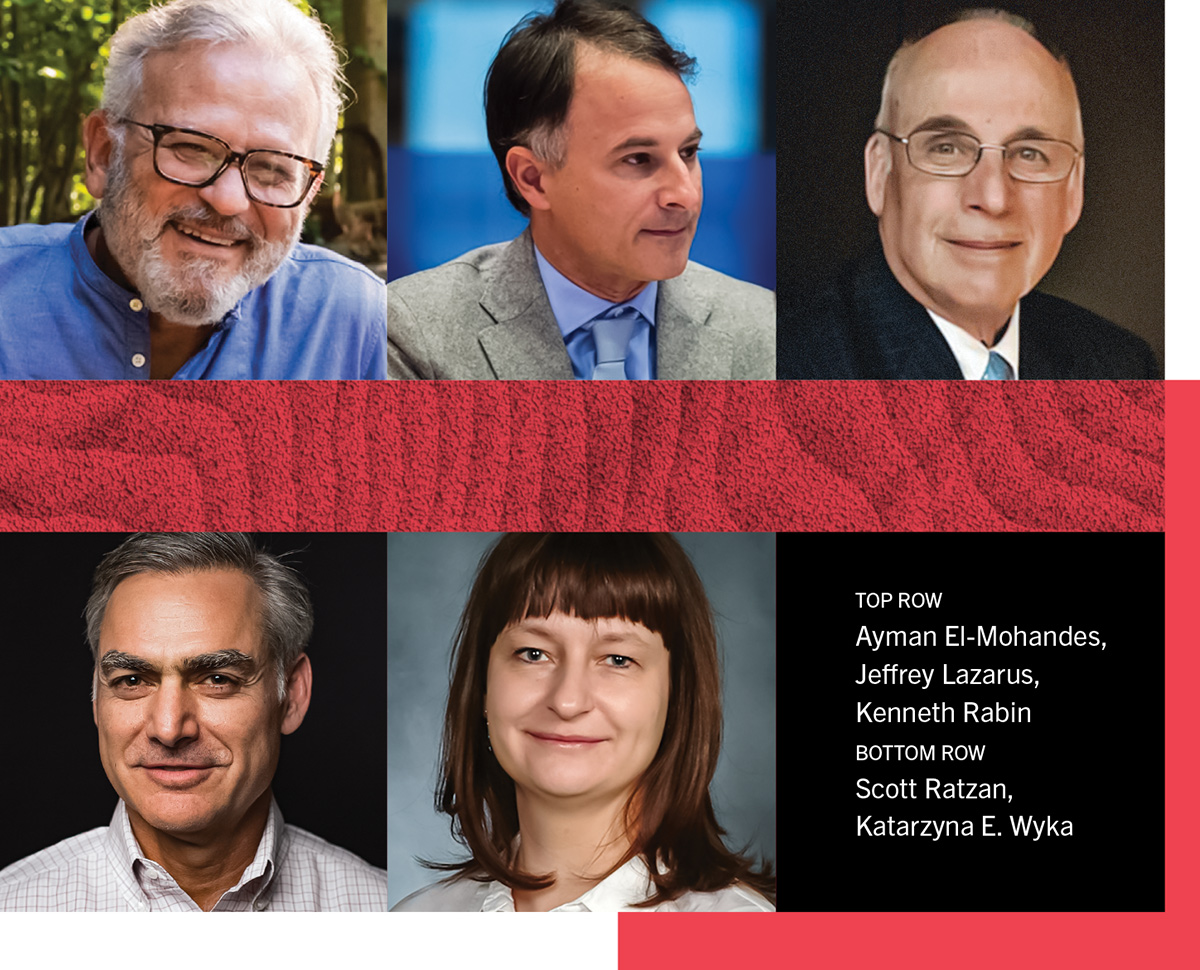
CUNY SPH ‘Sees a Good Idea Early On’
The idea for the surveys began in March 2020, soon after the World Health Organization declared Covid-19 a global pandemic. Dr. Lazarus, who has spent his career working in infectious disease areas such as HIV and viral hepatitis, including working at the WHO for over a decade, and Dr. Ratzan, an expert in health communication who was vice president of global health for Johnson and Johnson and at the U.S. Agency for International Development (USAID), decided to collaborate on a survey of how citizens in different countries viewed their governments’ pandemic response. They and Dr. Rabin, who later joined them, had a long-standing interest in understanding and assessing how governments communicate in response to public health crises. They recognized that trust would heavily impact whether people would respect the unprecedented restrictions on global movement that governments were putting into place to control Covid-19.
Dr. Lazarus and Dr. Ratzan also had engaged in health communication projects including treatment, immunization, or prevention measures for other diseases. Dr. Lazarus had notably conducted research about a potential AIDS vaccination and treatment. Dr. Ratzan co-founded CONVINCE (COVID-19 New Vaccine Information Communication and Engagement) USA along with Dr. Heidi Larson of the Vaccine Confidence Project to advance vaccine literacy and uptake. CONVINCE USA is linked with CUNY SPH to build vaccine confidence in the U.S. and globally.
“The study was based on a very simple idea,” says Dr. Lazarus. “Let’s see what the public thinks. We want them to do the right thing, so we’re going to ask them how they feel about these measures being put into place by their governments.”
Public health benefactor Jonathan Fielding provided initial support for the study in 2020. Drs. Ratzan and Lazarus then approached Dean El-Mohandes, who enthusiastically committed CUNY SPH to the effort. The school had been conducting surveys in the New York area, and the dean recognized the opportunity to broaden the work globally. They also received support from the U.S. Council for International Business Foundation.
For the 2021 study, the team continued to be supported by CUNY SPH, receiving additional support from Dalhousie University and the University of Calgary in Canada and the University of Barcelona in Spain. Outside of CUNY, they joined with Heidi Larson of the London School of Hygiene and Tropical Medicine’s Vaccine Confidence Project; Lawrence Gostin, a Georgetown University professor who specializes in public health law; Spencer Kimball, a political consultant and polling expert at Emerson College; and Adam Palayew, an epidemiologist at the Barcelona Institute of Global Health at the time of the initial study.
“CUNY SPH stepped up and saw a good idea early on and drove it forward, and it’s had a global impact,” said Dr. Lazarus. “It wasn’t a one-off or an academic exercise. It was a real-time, ahead-of-the-curve study on vaccine hesitancy and public perception of the control measures that has received massive media attention and contributed to policy change.”
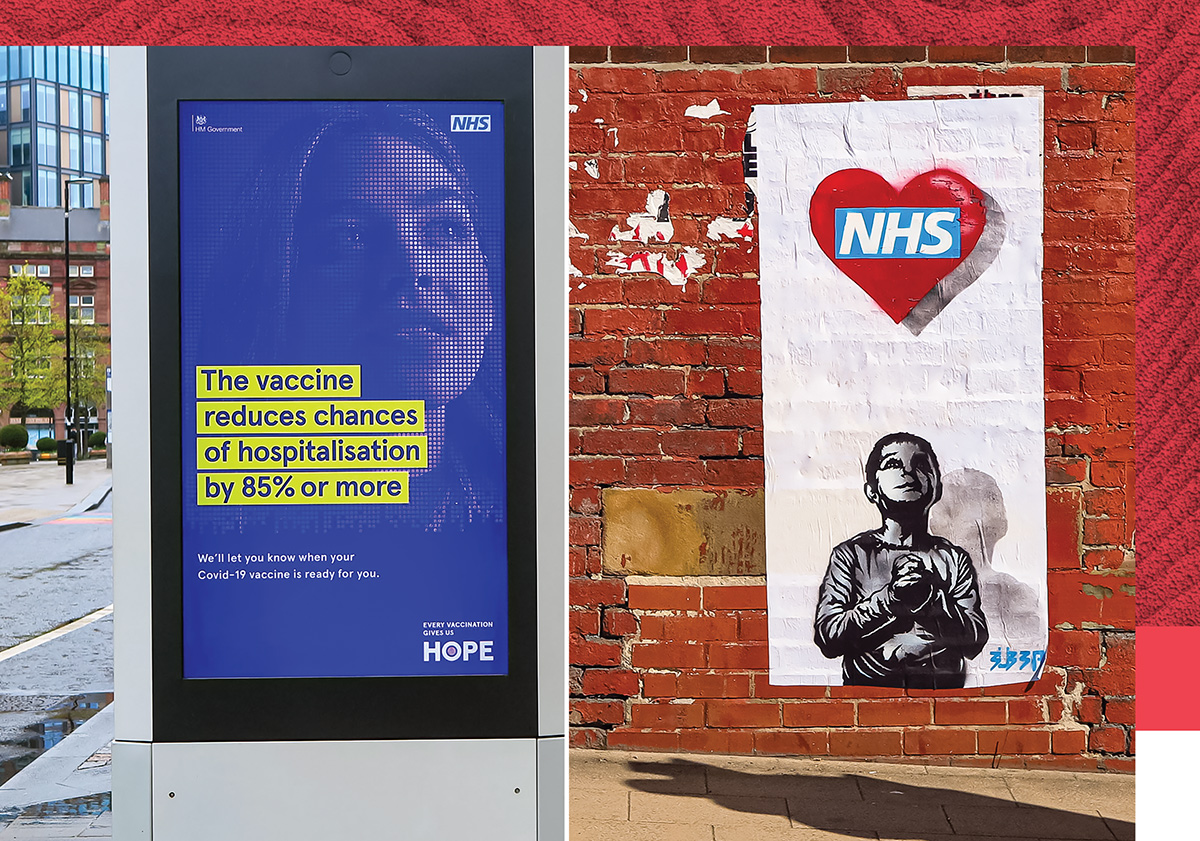
GOVERNMENT MESSAGING VS. STREET ARTWORK— SHEFFIELD, UK. An advertisement from the United Kingdom’s NHS promoting vaccination, and a piece of street art expressing appreciation for the NHS. Photos by Tim Dennell
The Significance of Government Trust
One of the most important findings of the surveys was that trust in a government’s response to the Covid-19 crisis predicted vaccine acceptance rates across countries. The first survey the team conducted, which they called the “Covid Score,” polled respondents on their perceptions of their government’s performance, asking them to rank from one to five the degree to which they agreed with statements such as that authorities were communicating clearly and consistently about the pandemic, testing was widely available and free, and the healthcare system could meet national needs.
Results again were all over the map, from as low as 36 percent in Ecuador to as high as 80 percent in China. (The researchers note that China’s restrictions on anti-government speech must be kept in mind when considering these result). Of concern, in the majority of countries surveyed, trust was below 60 percent, and particularly low in Latin American and European countries and the U.S. Trust in government is critical for citizens’ decisions to comply with public health measures that rely on behavior modification, like wearing a mask and social distancing.
“The main message around the world is people aren’t sufficiently trusting in their governments and do not universally believe in all of the pandemic control measures,” says Dr. Lazarus. “They are the right measures, so it’s very concerning that people don’t understand that.”
Can the Vaccine Hesitant Be Convinced—or Mandated?
According to the 2021 survey responses, the single greatest predictor of whether someone will get vaccinated is whether they agree with the following statements: “I trust the science behind the Covid vaccine,” or “Vaccines available to me are safe.” Those personally impacted by the disease also reported being more likely to support getting vaccinated.
“If they got sick, somebody in their family got sick, or if somebody in their family died, their acceptance rate was higher,” says Dean El-Mohandes. “It didn’t matter what the incidence in their country was at large. What mattered was their personal experience with this disease.”
Other factors linked to likelihood of getting vaccinated are having a higher education and income level or being of older age.
According to Dr. Wyka, these findings can help societies understand barriers to vaccination so they can increase uptake. “The overarching goal of information coming from surveys like this is to develop tailored communication and policies to combat misconception of vaccines and improve vaccination rates across the globe,” she says.
For instance, respondents reported being most likely to get a vaccine if their doctor recommended it, rather than employer—though workplace recommendations did have more sway for younger respondents.
Since the survey shows losing a loved one to Covid-19 is particularly impactful, “we could have more people who were infected encouraged to become spokespersons and advocates for the vaccine,” says Dean El-Mohandes.
Meanwhile the study found that those with at least moderate levels of depression in several European countries, including France, Germany, Poland, and Sweden, reported they were significantly less likely to get vaccinated, which suggests a possible mental health intervention could improve vaccination in those countries.
The responses also found that people may be open to certain mandates, particularly requiring vaccination as a condition for travel.
What these responses ultimately suggest, says Dr. Ratzan, is that convincing vaccine hesitant people, though a challenge, is not a lost cause. “People who present as vaccine hesitant may be moved by effective communication and policy interventions. We can build their confidence with policies supporting workplace mandates, engaging medical professionals, and reminding them through religious or social events.”
Insights for Public Health Communication
The significance of public perception speaks to the need for a strong communication strategy. Dr. Ratzan recommends leaders speak clearly and consistently to the public through a centralized information source. For example, Denmark held a press conference every week with key ministers who advised about rules related to travel, dining in restaurants, and vaccination.
There should also be a clear roadmap with benchmarks that tie lifting or imposing restrictions to case numbers and describe what progress looks like, which countries including the United Kingdom under Prime Minister Boris Johnson and the U.S. under President Joe Biden have done. And preventing the spread of Covid-19 must not cost people money, for instance by ensuring testing and vaccination is free.
Finally, policymakers need to engage trusted decision-makers to address vaccine literacy and respect religious and philosophical beliefs of communities, as well as historic issues that have bred distrust.
“The government can work with leaders of civic, religious, and medical organizations, as well as the private sector on mass vaccination programs, including finding credible spokespeople, encouraging local engagement, and providing accurate information and technological support,” says Dr. Ratzan.
The survey has also been used to train CUNY SPH students in the Master of Science degree in Health Communication for Social Change, which Dr. Ratzan directs and for which Dr. Rabin advises. A group of students from the program are working with a public relations expert in Washington, D.C., through a grant awarded to CONVINCE USA from the Centers for Disease Control Foundation, on a social media campaign called Big Shots Heroes profiling individuals who have successfully increased Covid-19 vaccination in their communities.
Flagging Anti-Vaccination as a Looming Issue
The CUNY team and several of their collaborators flagged vaccine hesitancy as a challenge long before the pandemic.
In 2011, Dr. Ratzan co-authored a Lancet article with Dr. Larson about what they referred to as “the vaccine confidence gap,” which began their collaboration on the issue. In 2019, in response to declines in vaccinations and measles outbreaks in 11 U.S. states, Dr. Ratzan, with Gostin, Barry R. Bloom, and Dr. Fielding recommended in a Washington Post op-ed that the federal government eliminate non-medical exemptions to vaccinations and launch a campaign to communicate the safety of vaccines for children.
In 2019, Dean El-Mohandes, Dr. Ratzan, and Dr. Rabin, along with Dr. Larson, Dr. Fielding, Gostin, and others, authored the Salzburg Statement on Vaccination Acceptance, raising alarms about growing resistance among parents to childhood vaccination globally and identified vaccine misinformation and lack of access as key challenges—issues that have become critical during the pandemic.
Vaccination resistance will continue to be a serious challenge beyond Covid-19, experts say, and not just in the U.S. As the survey found, Eastern European countries had wide hesitancy, as did Nigeria and South Africa.
It will be important to continue to try to understand why there is such a strong reaction against vaccination in certain regions, says Dean El-Mohandes. He notes the U.S.’ media landscape, where propaganda and misinformation are particularly easy to spread.
“We anticipated that this increasingly hot-button issue would become front and center,” adds Dr. Rabin. “And CUNY SPH emerged as a leading U.S. voice in vaccine hesitancy research by joining forces with other leaders in the field, who recognized the energy and insights that we brought to the table.”
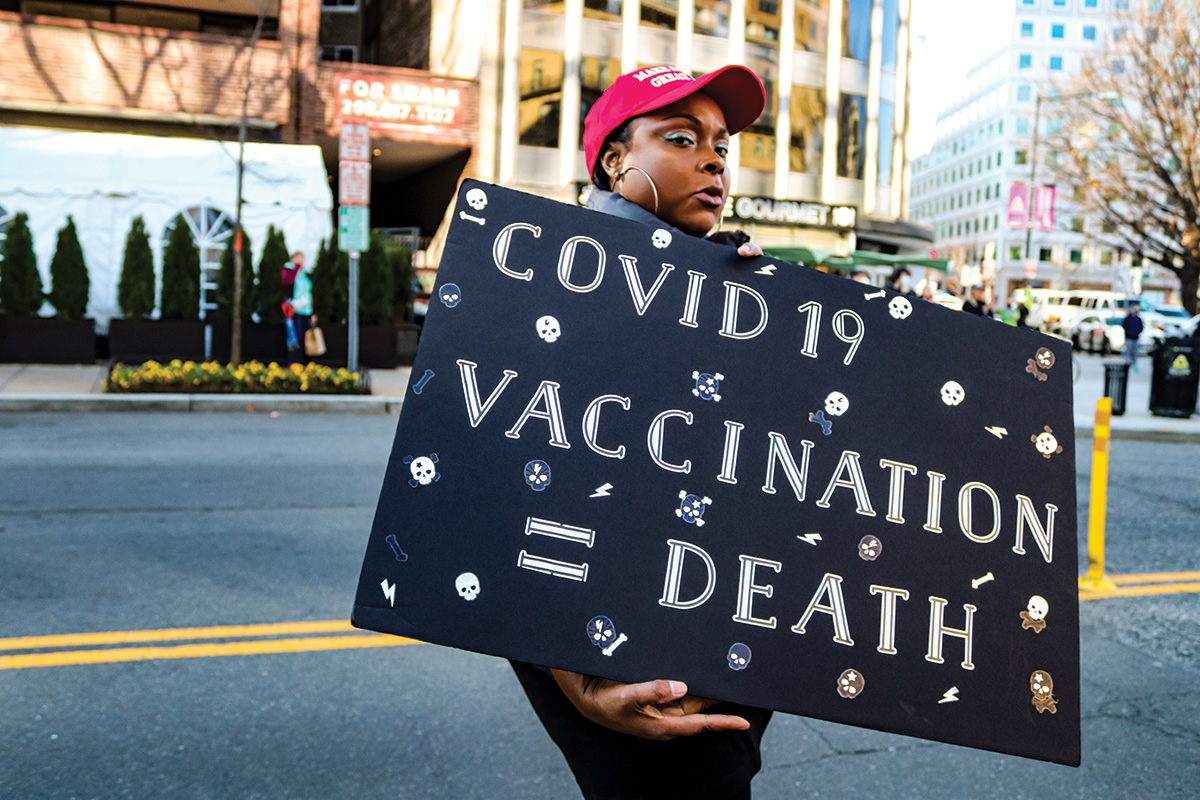
A demonstrator in Washington, DC on December 12, 2020—expressing a polarized negative opinion of vaccination.

